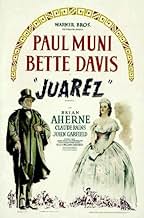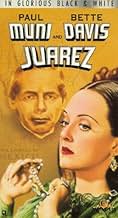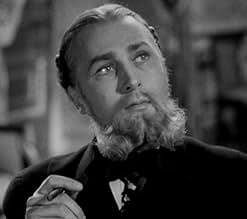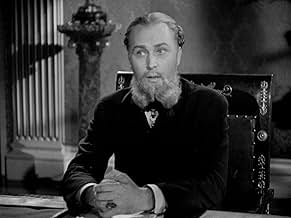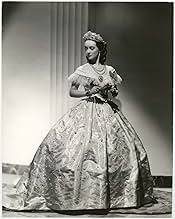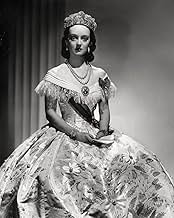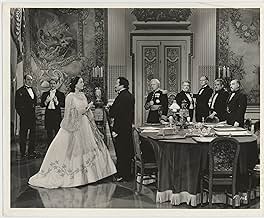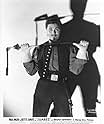CALIFICACIÓN DE IMDb
6.9/10
2.7 k
TU CALIFICACIÓN
Luis Napoleón III aprovecha la Guerra Civil Americana para eludir la Doctrina Monroe y expandir su poder ayudando al emperador Maximiliano Habsburgo a añadir México a su imperio.Luis Napoleón III aprovecha la Guerra Civil Americana para eludir la Doctrina Monroe y expandir su poder ayudando al emperador Maximiliano Habsburgo a añadir México a su imperio.Luis Napoleón III aprovecha la Guerra Civil Americana para eludir la Doctrina Monroe y expandir su poder ayudando al emperador Maximiliano Habsburgo a añadir México a su imperio.
- Dirección
- Guionistas
- Elenco
- Nominado a 1 premio Óscar
- 3 premios ganados y 1 nominación en total
Opiniones destacadas
This is one of five biopics that William Dieterle made for producer Hal B. Wallis at Warner Bros in as many years and the third to star Paul Muni in the title role. Excellent production values suffice it to say. Tony Gaudio is behind the camera and there is a symphonic score by Korngold arranged and orchestrated by Hugo Freidhofer with an effective use of 'La Paloma'.
Film historian David Thompson has dismissed these biopics as being Germanic and stagey. He is fully entitled to his opinion of course but I think his verdict to be harsh especially when one considers the first class actors, both leading and supporting, who appeared in these films.
The characters that linger longest in the memory from this are those of Brian Aherne as Maximilian and Bette Davis as his wife Carlotta. Aherne has never been better quite frankly while Davis is absolutely stupendous in the role. Their scenes together are beautifully understated and the scene where she confronts the ignominious Louis Napoleon, played with relish by Claude Rains, is magnificent. Her descent into madness is subtly handled.
Interesting also to see as future president Diaz that human dynamo John Garfield whose greatest roles were still to come.
Paul Muni I must confess has never really been my cup of tea but that is only my opinion.
The 'execution' of monarchs understandably has always caused more emotional outrage and controversy than that of dictators.
In this film at any rate Juarez feels remorse but his refusal to grant Maximilian a pardon is certainly a blot on his historical reputation.
Excellent film by a European director who adapted to and thrived under the Hollywood system.
As an historical document it is certainly off-centre in many respects but as a piece of entertainment it certainly hits the mark.
Brian Aherne, as the Emperor Maximillian, is the strongest thing going for this historical film depicting the failed attempt by Louis Napoleon to create a puppet government in Mexico. The rest of the casting is uneven at best. John Garfield is badly miscast as Diaz, as is that great character actor Donald Crisp. Paul Muni playing the Zapotac Indian, Benito Juarez, manages to just look stoic and sullen and is not called upon to do much acting. Maybe it's the makeup! Claude Rains and Gale Sondergaard are outstanding as Napoleon III and his queen Eugenie and they play at the devious political game with just the right amount of intrigue.
The film is historically correct and that is part of the problem. The filmmakers put every incident that led to the fall of Maximillian into the story and the film drags on and on. It's more information that we need to know.
There are mixed opinions on the Bette Davis portrayal of Empress Carlotta, the unstable wife of Maximillian. Hers is an interesting story but Davis may not have put enough incipient madness into her characterization.
On the whole,this is a pretty good history lesson with no Hollywood happy ending tacked on, that tells of a well meaning, gentle man who was badly used by the French emperor, sent to rule a people of whom he knew nothing, in a land where he was not wanted. And Aherne absolutely is perfect for the part.....he is the star of this film.
The film is historically correct and that is part of the problem. The filmmakers put every incident that led to the fall of Maximillian into the story and the film drags on and on. It's more information that we need to know.
There are mixed opinions on the Bette Davis portrayal of Empress Carlotta, the unstable wife of Maximillian. Hers is an interesting story but Davis may not have put enough incipient madness into her characterization.
On the whole,this is a pretty good history lesson with no Hollywood happy ending tacked on, that tells of a well meaning, gentle man who was badly used by the French emperor, sent to rule a people of whom he knew nothing, in a land where he was not wanted. And Aherne absolutely is perfect for the part.....he is the star of this film.
JUAREZ, despite playing fast and loose with certain historical facts, is nevertheless rousing and sumptuous epic film-making about the struggle for justice - on the one hand by the Mexican people and on the other by their hapless monarch.
The people are represented by Paul Muni impersonating Mexican president Benito Juarez; his expressionless face and slow, monotonous line readings are almost laughable; he comes across as a sort of Unconquerable Zombie of the People. He almost always appears in the same frame as a portrait of his hero and contemporary, Abraham Lincoln. As others have pointed out, his most powerful moment comes when he walks purposefully toward a line of armed soldiers in one of those moments of truth at the core of all successful revolutions: the refusal of the armed forces to defend the established regime.
The hounded monarch, Archduke Maximilian, is played by Brian Aherne in what may well be the best casting he was ever assigned on film. His performance is letter perfect as the idealistic puppet of Napoleon III who stuck to his outmoded principles despite overwhelming odds in much the same way as Nicholas II did in Russia decades later. In another parallel to the later Russian events, his domineering wife Carlotta (played by a beautifully photographed, no-holds-barred, black-bewigged Bette Davis) takes matters into her own hands to support his flimsy but ardent claim to the leadership of the country; Aherne, like Muni, is also frequently seen in proximity to a framed portrait - of his wife.
This is an expensive production with lavish costumes, stunning set pieces, gorgeous music, literate dialogue, a who's who of excellent supporting players, and breathtaking photography (the latter by veteran cameraman Tonio Gaudio, some of whose visions, especially Carlotta's prayer to the Virgin Mary and her final scene in a sunlit chamber, recall the most ethereal imagery of the silent era). All of these elements work together to get our blood surging in sympathy for the downtrodden Mexican peasantry as they rise up against cold hearted official corruption. And on a smaller level we feel equally moved by the personal plight of Maximilian.
With so much stuffing, not everything works perfectly. John Garfield, one of the best film actors of his time, is unconvincing as a Mexican general. There is a problem with pacing and informational overkill. Muni's sleepwalking performance contributes to a sense of sluggishness. Whenever he appears you brace yourself for a plodding and profound dose of Great Truth. At least these Truths are not banalities, so they are somewhat worth waiting for.
The people are represented by Paul Muni impersonating Mexican president Benito Juarez; his expressionless face and slow, monotonous line readings are almost laughable; he comes across as a sort of Unconquerable Zombie of the People. He almost always appears in the same frame as a portrait of his hero and contemporary, Abraham Lincoln. As others have pointed out, his most powerful moment comes when he walks purposefully toward a line of armed soldiers in one of those moments of truth at the core of all successful revolutions: the refusal of the armed forces to defend the established regime.
The hounded monarch, Archduke Maximilian, is played by Brian Aherne in what may well be the best casting he was ever assigned on film. His performance is letter perfect as the idealistic puppet of Napoleon III who stuck to his outmoded principles despite overwhelming odds in much the same way as Nicholas II did in Russia decades later. In another parallel to the later Russian events, his domineering wife Carlotta (played by a beautifully photographed, no-holds-barred, black-bewigged Bette Davis) takes matters into her own hands to support his flimsy but ardent claim to the leadership of the country; Aherne, like Muni, is also frequently seen in proximity to a framed portrait - of his wife.
This is an expensive production with lavish costumes, stunning set pieces, gorgeous music, literate dialogue, a who's who of excellent supporting players, and breathtaking photography (the latter by veteran cameraman Tonio Gaudio, some of whose visions, especially Carlotta's prayer to the Virgin Mary and her final scene in a sunlit chamber, recall the most ethereal imagery of the silent era). All of these elements work together to get our blood surging in sympathy for the downtrodden Mexican peasantry as they rise up against cold hearted official corruption. And on a smaller level we feel equally moved by the personal plight of Maximilian.
With so much stuffing, not everything works perfectly. John Garfield, one of the best film actors of his time, is unconvincing as a Mexican general. There is a problem with pacing and informational overkill. Muni's sleepwalking performance contributes to a sense of sluggishness. Whenever he appears you brace yourself for a plodding and profound dose of Great Truth. At least these Truths are not banalities, so they are somewhat worth waiting for.
From "Pancho Villa Starring Himself" to "The Mexican" and the execrable "Man on Fire" (produced by an Englishman, from an Italian script loosely based on an incident in Columbia... reset in Mexico), Hollywood has never made a film about Mexico that doesn't fall back on clichés and cartoonish "gringo-centric" stereotypes. Despite some problems, Juarez is an honorable exception.
The problem with the screenplay is that Bettina Harding bought the romantic, Euro-centric notion of Max and Carlotta as figures in a "tragic romance". They were patsies for Napoleon III's global ambitions (something the film does very well), but everyone in Mexico knows the two were complete fools who destroyed the economy, and hardly the loving couple depicted in the movie. Max was a syphilitic, pretentious twit. He neglected Carlotta (the "Casa Obvio", his summer house in Cuernavaca that he built, "forgetting" to include rooms for Carlotta is a popular tourist attraction now, and a botanical museum), had a son by his mistress, "la Bonita India" and -- infected his wife.
The other reviewer is unintentionally misleading when he writes that Carlotta lived in seclusion for 60 years. She was bed-ridden most of the time, suffering tertiary syphilis, requiring round-the-clock medical care. She did indeed, like in the film, go bonkers -- but in the Vatican, not in a French palace. The Papacy was a major player in the geo-politics surrounding the Mexican adventure, but the film (perhaps wisely) simplifies the politics.
But, what the hey -- it's Hollywood! It has the perfect cast for this kind of epic: who better to play stoic, long-suffering historical figures than Paul Muni? Who does devious Europeans better than Claude Raines and Donald Crisp? I really enjoy seeing Porfirio Diaz (who later seized the Mexican presidency in a coup, and maintained control for close to 35 years -- and is now a mixed figure in Mexican history, sort of like Lenin with the Russians, or Ataturk among the Turks) played by John Garfield. And who better to go completely bonkers and chew up the scenery than Bette Davis? By all means, watch the movie, but then read your Mexican history.
The problem with the screenplay is that Bettina Harding bought the romantic, Euro-centric notion of Max and Carlotta as figures in a "tragic romance". They were patsies for Napoleon III's global ambitions (something the film does very well), but everyone in Mexico knows the two were complete fools who destroyed the economy, and hardly the loving couple depicted in the movie. Max was a syphilitic, pretentious twit. He neglected Carlotta (the "Casa Obvio", his summer house in Cuernavaca that he built, "forgetting" to include rooms for Carlotta is a popular tourist attraction now, and a botanical museum), had a son by his mistress, "la Bonita India" and -- infected his wife.
The other reviewer is unintentionally misleading when he writes that Carlotta lived in seclusion for 60 years. She was bed-ridden most of the time, suffering tertiary syphilis, requiring round-the-clock medical care. She did indeed, like in the film, go bonkers -- but in the Vatican, not in a French palace. The Papacy was a major player in the geo-politics surrounding the Mexican adventure, but the film (perhaps wisely) simplifies the politics.
But, what the hey -- it's Hollywood! It has the perfect cast for this kind of epic: who better to play stoic, long-suffering historical figures than Paul Muni? Who does devious Europeans better than Claude Raines and Donald Crisp? I really enjoy seeing Porfirio Diaz (who later seized the Mexican presidency in a coup, and maintained control for close to 35 years -- and is now a mixed figure in Mexican history, sort of like Lenin with the Russians, or Ataturk among the Turks) played by John Garfield. And who better to go completely bonkers and chew up the scenery than Bette Davis? By all means, watch the movie, but then read your Mexican history.
What drew me into seeing Juarez in the first place were the cast and that Korngold wrote the music. And while it is far from perfect, there are definitely a lot of good things. It does look exquisite, not just in the lavishly rendered costumes and sets but also in the sweeping cinematography. Korngold's score is splendid also, full of the rich and rousing melodies he is famous for, if not quite on the same level as the scores he did for Prince and the Pauper, Captain Blood, The Sea Hawk and especially The Adventures of Robin Hood. The Mexican history is interesting and I did find it informative, and most of the acting is fine. In particular Bette Davis who is very compelling in her role, Brian Aherne's dignified Maximillian and Claude Rains who plays urbane better than anyone(except perhaps Cary Grant). Donald Crisp, Montagu Love and Joseph Calleia are excellent also. However there are debits, while the script is mostly literate it also suffers from being too talky and trying to tell us too much. The film is perhaps overlong, and is rather tedious in the pace at times. And two actors unfortunately didn't work for me. Paul Muni, wonderful in Scarface, The Good Earth and The Life of Emile Zola, not helped by very heavy make-up is far too stoic and stiff in the lead. And while he tries hard to give the honest intensity the small role of Porfirio Diaz, John Garfield just ended up being out of place. On the whole, a great cast, a splendid score and lavish production values are definite things to like, but Juarez is spoilt sadly by bad pacing, too much talk and two actors who don't convince as much as they should. 6/10 Bethany Cox
¿Sabías que…?
- TriviaBecause the film shows a number of Maximilian's generals to be Mexican, many viewers attribute it to typical Hollywood historical distortions. It is, however, indeed accurate. It's a little-known fact that, although Maximilian was eventually overthrown and executed by Mexican revolutionaries, there were more Mexicans fighting on Maximilian's side than against him. This was due in large part to the Catholic Church's strong support of the French occupation of Mexico and its encouraging of Mexican Catholics to fight against the revolutionary forces by joining Maximilian's army, which they did in large numbers.
- ErroresWhen Napoleon III is informed in a letter that Robert E. Lee has been defeated at Gettysburg, he responds by paraphrasing Lincoln's famous Gettysburg Address by calling democracy as government for the people, by the people, etc. He couldn't have known Lincoln's speech flourish because it wasn't given until November 19, 1863, more than four months after the battle.
- Citas
Emperor Louis Napoleon III: Democracy! Government of the cattle, by the cattle, for the cattle!
- Versiones alternativasIn 1952, the film was re-released and several key scenes were removed, particularly sequences that contained dialogue that criticized countries which, in 1939 had been regarded as totalitarian, but which, by the early 1950s had become Cold War allies of the United States and could therefore no longer be criticized as imperialist adventurers. Germany and Italy, especially, former enemies in the 1940s, were now the cornerstone of NATO. The removal of these scenes obfuscated the narrative considerably, in particular, removing any clear reasons behind the execution of the Emperor Maximilian at the conclusion of the film. This revised print runs 106 minutes and is the version released on video and generally available today. The 1939 version is preserved on nitrate stock in the Warner Archive.
- ConexionesFeatured in Hollywood and the Stars: The Angry Screen (1964)
- Bandas sonorasMy Country Tis of Thee
(uncredited)
Music attributed to Henry Carey (1744)
Played as part of the score when America is mentioned
Selecciones populares
Inicia sesión para calificar y agrega a la lista de videos para obtener recomendaciones personalizadas
- How long is Juarez?Con tecnología de Alexa
Detalles
- Tiempo de ejecución
- 2h 5min(125 min)
- Color
- Mezcla de sonido
- Relación de aspecto
- 1.37 : 1
Contribuir a esta página
Sugiere una edición o agrega el contenido que falta


